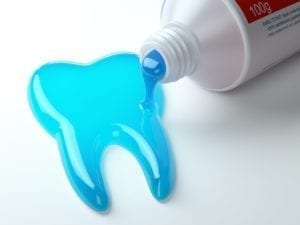Tooth enamel is the hardest substance in our body, yet it is also porous. It helps to protect other services of our teeth. However, with consistent exposure to acids, such as plaque that forms on your teeth, this can penetrate into openings of the enamel and corrupt its internal structure. This process is called demineralization and can create vulnerability in the tooth that can become a cavity that needs a dental filling. Fluoride works to prevent tooth decay. It slows down the erosion of enamel. It increases the rate of remineralization, which is a process where new enamel crystals form harder, larger, and more resistant to acid. Learning what fluoride is and how it works will help you become more aware of how to identify plaque and prevent it from becoming a cavity.
Topical fluoride strengthens the teeth once they have erupted. It seeps into the enamel, making the teeth more resistant to decay. Using products such as fluoride-containing toothpaste, over the counter rinses, professionally applied treatments, or prescription products are ways to gain topical fluoride. We recommend that children and adults have professional applications of fluoride twice a year during your preventative visits.
Be sure to speak with one of our dental team members about fluoride in your daily oral hygiene regimen if any of the following is a part of your recent dental history:
- Orthodontics and prosthodontics appliances
- Reduced salivary function due to medications, medical treatments, or medical conditions
- Family history of dental caries, also known as dental cavities
- Frequent intake of sugar or carbohydrates
- Inability to clean teeth properly at home
- Deep pit and fissures on chewing surfaces of teeth
- Exposed root surfaces
- Recent history of dental caries
- Inadequate exposure to fluoride
Fluoride plays a key role in the health of your mouth, and now that you know the importance of it, you can feel comfortable including this into your routine visits. Call Dr. Freano or schedule an appointment online today!
